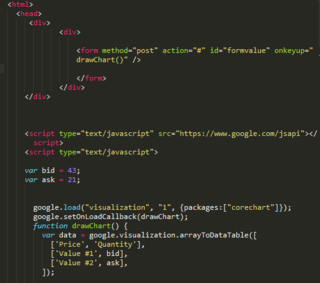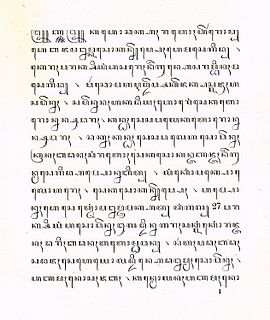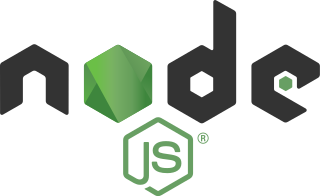Related Research Articles

JavaScript, often abbreviated JS, is a programming language that is one of the core technologies of the World Wide Web, alongside HTML and CSS. As of 2022, 98% of websites use JavaScript on the client side for webpage behavior, often incorporating third-party libraries. All major web browsers have a dedicated JavaScript engine to execute the code on users' devices.

A Java virtual machine (JVM) is a virtual machine that enables a computer to run Java programs as well as programs written in other languages that are also compiled to Java bytecode. The JVM is detailed by a specification that formally describes what is required in a JVM implementation. Having a specification ensures interoperability of Java programs across different implementations so that program authors using the Java Development Kit (JDK) need not worry about idiosyncrasies of the underlying hardware platform.
Prototype-based programming is a style of object-oriented programming in which behaviour reuse is performed via a process of reusing existing objects that serve as prototypes. This model can also be known as prototypal, prototype-oriented,classless, or instance-based programming.
In computing, cross-platform software is computer software that is designed to work in several computing platforms. Some cross-platform software requires a separate build for each platform, but some can be directly run on any platform without special preparation, being written in an interpreted language or compiled to portable bytecode for which the interpreters or run-time packages are common or standard components of all supported platforms.
ECMAScript (ES) is a JavaScript standard intended to ensure the interoperability of web pages across different browsers. It is standardized by Ecma International in the document ECMA-262.

SpiderMonkey is the first JavaScript engine, written by Brendan Eich at Netscape Communications, later released as open source and currently maintained by the Mozilla Foundation. It is used in the Firefox web browser.
JScript is Microsoft's legacy dialect of the ECMAScript standard that is used in Microsoft's Internet Explorer 11 and older.

Madurese is a language of the Madurese people, native to the Madura Island and Eastern Java, Indonesia; it is also spoken by migrants to other parts of Indonesia, namely the eastern salient of Java, the Masalembu Islands and even some on Kalimantan. It was traditionally written in the Javanese script, but the Latin script and the Pegon script is now more commonly used. The number of speakers, though shrinking, is estimated to be 8–13 million, making it one of the most widely spoken languages in the country. Bawean Madurese, which is a dialect of Madurese, also spoken by Baweanese descendants in Malaysia and Singapore.

Apache Groovy is a Java-syntax-compatible object-oriented programming language for the Java platform. It is both a static and dynamic language with features similar to those of Python, Ruby, and Smalltalk. It can be used as both a programming language and a scripting language for the Java Platform, is compiled to Java virtual machine (JVM) bytecode, and interoperates seamlessly with other Java code and libraries. Groovy uses a curly-bracket syntax similar to Java's. Groovy supports closures, multiline strings, and expressions embedded in strings. Much of Groovy's power lies in its AST transformations, triggered through annotations.
JScript .NET is a .NET programming language developed by Microsoft.

The Kawi or Old Javanese script is a Brahmic script found primarily in Java and used across much of Maritime Southeast Asia between the 8th century and the 16th century. The script is an abugida meaning that characters are read with an inherent vowel. Diacritics are used, either to suppress the vowel and represent a pure consonant, or to represent other vowels.
Kaleida Labs formed in 1991 to produce the multimedia cross-platform Kaleida Media Player and the object oriented scripting language ScriptX that was used to program its behavior. The system was aimed at the production of interactive CD ROM titles, an area of major effort in the early 1990s. When the system was delivered in 1994, it had relatively high system requirements and memory footprint, and lacked a native PowerPC version on the Mac platform. Around the same time, rapid changes in the market, especially the expansion of the World Wide Web and the Java programming language, pushed the interactive CD market into a niche role. The Kaleida platform failed to gain significant traction and the company was closed in 1996.

JSON is an open standard file format and data interchange format that uses human-readable text to store and transmit data objects consisting of attribute–value pairs and arrays. It is a common data format with diverse uses in electronic data interchange, including that of web applications with servers.
TypeScript is a free and open source programming language developed and maintained by Microsoft. It is a strict syntactical superset of JavaScript and adds optional static typing to the language. It is designed for the development of large applications and transpiles to JavaScript. As it is a superset of JavaScript, existing JavaScript programs are also valid TypeScript programs.
ZK is an open-source Ajax Web application framework, written in Java, that enables creation of graphical user interfaces for Web applications with little required programming knowledge.

Node.js is an open-source, cross-platform, back-end JavaScript runtime environment that runs on a JavaScript Engine and executes JavaScript code outside a web browser, which was designed to build scalable network applications. Node.js lets developers use JavaScript to write command line tools and for server-side scripting—running scripts server-side to produce dynamic web page content before the page is sent to the user's web browser. Consequently, Node.js represents a "JavaScript everywhere" paradigm, unifying web-application development around a single programming language, rather than different languages for server-side and client-side scripts.
Dart is a programming language designed for client development, such as for the web and mobile apps. It is developed by Google and can also be used to build server and desktop applications.
Windows Runtime (WinRT) is a platform-agnostic component and application architecture first introduced in Windows 8 and Windows Server 2012 in 2012. It is implemented in C++ and officially supports development in C++, Rust/WinRT, Python/WinRT, JavaScript-TypeScript, and the managed code languages C# and Visual Basic .NET (VB.NET).

Asynchronous module definition (AMD) is a specification for the programming language JavaScript. It defines an application programming interface (API) that defines code modules and their dependencies, and loads them asynchronously if desired. Implementations of AMD provide the following benefits:
Kotlin is a cross-platform, statically typed, general-purpose programming language with type inference. Kotlin is designed to interoperate fully with Java, and the JVM version of Kotlin's standard library depends on the Java Class Library, but type inference allows its syntax to be more concise. Kotlin mainly targets the JVM, but also compiles to JavaScript or native code via LLVM. Language development costs are borne by JetBrains, while the Kotlin Foundation protects the Kotlin trademark.
References
- ↑ "WMLScript Primer: JavaScript vs. WMLScript | WebReference". Archived from the original on December 9, 2016. Retrieved June 2, 2011.